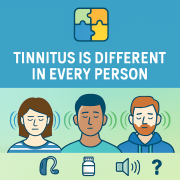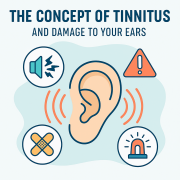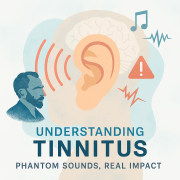Tinnitus is Different in Every Person
Tinnitus Unveiled: A Unique Experience for Everyone
There are millions of neural connections from the ear to the brain. As we age and are exposed to noise, certain medicines, viruses, etc., there’s irreversible damage and death to many of these neurons. Some of the damaged neural connections will manage to hold on longer and limp along, under-stimulated and under-serving the brain. These remaining nerves will succumb to neural suicide (apoptosis) over time unless stimulation is restored.
For the best information regarding tinnitus, please visit us at www.salushearing.com.
When describing these changes to patients, many will, in turn, say, ‘are you talking about USE IT OR LOSE IT?’ And they are 100% correct! Under-served and under-stimulated neurons will not function properly, get bored over time, and eventually not have the will to go on anymore, unless you can restore neural activity by providing sound stimulation. This is because the nerves that are there, that aren’t working to their full potential, need to be provided with direct acoustical, biological stimulation that keeps these nerves active, or else. Without ongoing stimulation, you lose them. And so, you may ask the question, why is tinnitus so different in every person?
Well, hearing loss is different in every person; there is no universal pattern. You could probably say that the vast majority have high-frequency tinnitus because the high-frequency section is damaged. You could generalize and say most people who have low-frequency sensorineural hearing loss have more of a low-frequency hum or roar. But in general, tinnitus, because it is a personal perception, is a subjective experience. It will be different for everybody.
There are different types and causes of tinnitus, and the experience is different for everyone. So, it is not surprising that there are varied types and causes. Let’s look at the four main types:
Subjective Tinnitus
This is the most common type. Your symptoms will typically occur because of exposure to loud noise.
While this kind of tinnitus can be permanent, we now know that it can vanish as suddenly as it appeared or even last for anywhere from three to twelve months at a time.
Neurological Tinnitus
When you have neurological tinnitus, your symptoms are generally caused by a disorder, such as Meniere’s disease, which affects the brain’s auditory functions.
Somatic Tinnitus
Somatic tinnitus is associated with the functioning of the sensory system in that it is initiated, exacerbated, or otherwise related to it. If your tinnitus can be made louder or quieter by moving the head, neck, jaw, or eyes, then this is a sign it may be somatic.
Objective Tinnitus
Spontaneous muscle contractions or vascular deformities can lead to this rare form of tinnitus. Unlike the other forms, an audiologist with equipment can hear this tinnitus, and in some cases, it can be fixed permanently.
As you now know, tinnitus can appear out of nowhere, so the cause is not always completely evident, particularly if there is no damage to the auditory system. It’s important to determine the root causes of the symptoms.
Most causes of tinnitus include the following:
- age
- extreme noise exposure
- several medications (i.e., aspirin, some antibiotics, some antidepressants, cancer drugs, and diuretics)
- earwax buildup
- ear infection
- TMJ (jaw joint dysfunction)
- chronic neck muscle strain
- cardiovascular disease
- a tumor (usually benign)
How about anxiety? Can it cause tinnitus?
Anxiety and stress are both emotional and physical considerations that have been associated with the onset of tinnitus. However, it is not yet evident as to whether anxiety and stress can cause the onset of tinnitus.
It is, however, clear that it can be a point of controversy. Some individuals find it hard to imagine that their emotions are responsible for this real auditory sensation. It can be frustrating, too, if you have chronic tinnitus, which in turn presents much extra stress and anxiety.
It has been determined that anxiety and stress can exacerbate your awareness of the ringing in your ears. Patients frequently describe their tinnitus symptoms as being triggered or the noise feeling louder when they are stressed, anxious, sad, or overwhelmed.
For some, the start of their tinnitus appears after a time of high stress or a traumatic event. There is considerable discussion as to whether these negative events and emotions really do make the tinnitus louder or whether they reduce the tolerance for detecting the symptoms, preventing a person from ignoring it to the degree that they would normally be able to.
We know that anxiety and stress undoubtedly play a role in living with tinnitus, so we do acknowledge them as contributing factors to tinnitus. Unfortunately, this can be challenging because a vicious cycle will then occur, causing the tinnitus to get worse. At that time, you start feeling more stressed, leaving you less capable of coping with the tinnitus.
We cannot stress enough the importance of having a good attitude when dealing with tinnitus. It goes a long way in how you manage your symptoms.
So, how about blood pressure? Can it cause tinnitus?
If your blood pressure is regularly high, this can be problematic for your health and can lead to tinnitus. Your healthcare hearing specialist will be able to tell you if your blood pressure is a likely cause of your tinnitus.
Having high or low blood pressure causes your inner ear structures to receive less blood flow and, thus, less oxygen reaching part of your ear. This is a cause of hearing loss and can increase your probability of developing hearing problems and/or tinnitus.
In addition, common medications used for high blood pressure are loop diuretics and aspirin. While normal doses should not cause any problems, they are known to cause tinnitus in high doses. The best way to combat this is to stick to a healthy plant-based diet, exercise more, drink less caffeine, eat less salt, and reduce stress and alcohol consumption.
Let’s talk about earwax. Can it cause tinnitus?
Earwax, a natural secretion found in the ear, plays an essential role by protecting the ear canal, keeping it lubricated, protecting against dust, dirt, and bacteria, and blocking infection.
I’ve said it before, and I’ll repeat it – earwax is usually best left alone as it should clear naturally. Using cotton swabs or any other object to remove earwax can potentially push it further into your ears and lead to impaction.
However, for some, it can collect more easily and is then problematic. This collection of buildup, when left untreated, can cause permanent damage, resulting in chronic tinnitus.
Also, some individuals with tinnitus have said that their symptoms become worse when their ears are full of wax. If you are concerned, contact your hearing healthcare specialist immediately to make an appointment.
Facts About Earwax and Hearing Loss that You’ve Never “Heard” Before.
We were recently reminded about this subject (earwax and hearing loss) when we saw an article about ear candling, the process of lying on your side with a lit candle placed inside your ear, allowing the warmth of the candle to “supposedly” soften the wax to a point where it is suctioned out. Our thoughts on this are NO, JUST NO. This process can cause blockage, punctured eardrums, and burns. Always get the advice of an experienced audiologist or hearing healthcare provider before doing anything to your ears!
Let us digress back to the facts that you may not have “heard”.
Fact No. 1 – The Truth About Earwax
The scientific name for earwax is cerumen, which is a mixture of oily skin cells inside the ear and secretions from the glands in the outer ear canal. The good thing about earwax is that it helps our ears clean themselves. That’s right, we have self-cleaning ears! In fact, every time you eat – as your jaw moves around during the chewing process – the wax inside of your ears is stirring around slowly from your eardrum to the opening of your ear. This is where it will either fall out on its own or dry up. Because our ears are self-cleaning, let them do their job naturally, never sticking anything in them for risk of impacting the wax or puncturing an eardrum. Note: earwax lubricates our ears much like tears lubricate our eyes.
Fact No. 2 – Can Earwax Lead to Hearing Loss?
The bottom line is YES, earwax can lead to hearing loss, but because those smart ears do their job well, it is not a common occurrence. You would truly need to have a lot of wax blockages to cause significant hearing loss; therefore – again – leave them to do their job naturally. Blockage is a slow “over time” process, and you should have ample warning of any problems, i.e., uncomfortable feelings of fullness in your ears or having a hard time hearing, like an underwater sound.
Fact No. 3 –Can Earwax Cause Tinnitus?
Again, the answer is YES. When the ear gets blocked up with wax, the brain can be deprived of sound – and thus create the phantom perception of sound, aka tinnitus! The blockage also creates an ‘echo chamber’ effect, which can increase the perception of underlying tinnitus.
Can inflammation cause tinnitus?
Inflammation is at the root of nearly all chronic diseases, and tinnitus is no different. It can come from many things, such as high blood sugar, toxins, and stress, but the main impact comes from the food that we eat, such as processed carbohydrates, simple sugars, gluten, inflammatory seed oils, artificial colors, and much more.
Food sensitivities can also trigger inflammation. These sensitivities are becoming more widespread due to poor gut health.
So, where do we start to reduce inflammation?
A great place to start reducing inflammation is to avoid processed food, cook from scratch, and really focus on whole foods.
You will want to start eliminating food with gluten, sugar, and inflammatory seed oils, like soybean oil, canola oil, and cottonseed oil. Please stop what you are doing right now and look at the items in your fridge. Today may be the day to start eating quality food.
Start focusing on quality meats, organic pasture-raised grass-fed and wild-caught, when possible, organic produce, and healthy fats like avocados, grass-fed ghee, cold-pressed coconut oil, cold-pressed olive oil, nuts, and seeds. Dr. Keith Darrow has a cookbook which he published to help you with this challenge. Grab a copy of Healthy Food Healthy Brain at www.PreventingDecline.com
Eating whole foods is an effective approach to reduce inflammation and improve your health, including addressing that bothersome tinnitus. Losing weight is another great way to reduce inflammation. Excess fat releases its inflammatory cytokines. A recent 2021 study on overweight people observed that those who participated in a healthy diet and daily exercise experienced significant improvement in their tinnitus symptoms.






 Proudly Canadian and Independently Owned and Operated
Proudly Canadian and Independently Owned and Operated 

